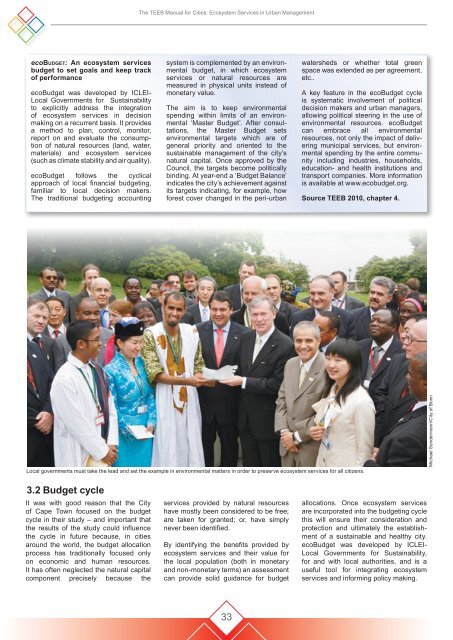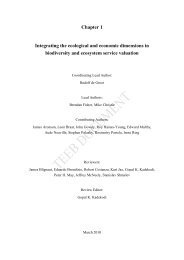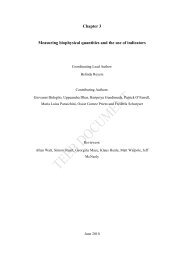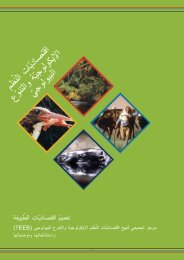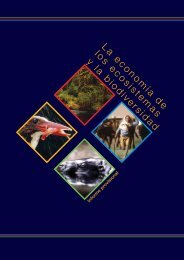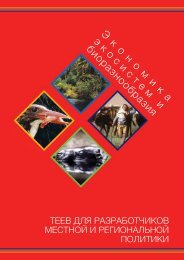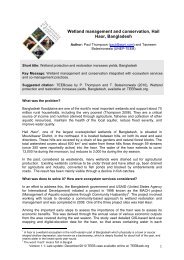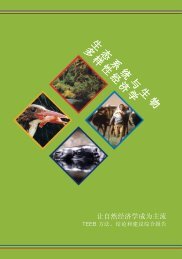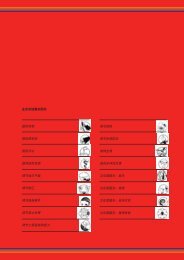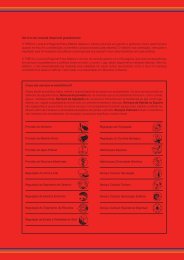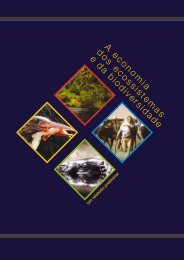TEEB Manual for Cities
TEEB Manual for Cities
TEEB Manual for Cities
Create successful ePaper yourself
Turn your PDF publications into a flip-book with our unique Google optimized e-Paper software.
The <strong>TEEB</strong> <strong>Manual</strong> <strong>for</strong> <strong>Cities</strong>: Ecosystem Services in Urban ManagementecoBudget: An ecosystem servicesbudget to set goals and keep trackof per<strong>for</strong>manceecoBudget was developed by ICLEI-Local Governments <strong>for</strong> Sustainabilityto explicitly address the integrationof ecosystem services in decisionmaking on a recurrent basis. It providesa method to plan, control, monitor,report on and evaluate the consumptionof natural resources (land, water,materials) and ecosystem services(such as climate stability and air quality).ecoBudget follows the cyclicalapproach of local financial budgeting,familiar to local decision makers.The traditional budgeting accountingsystem is complemented by an environmentalbudget, in which ecosystemservices or natural resources aremeasured in physical units instead ofmonetary value.The aim is to keep environmentalspending within limits of an environmental‘Master Budget’. After consultations,the Master Budget setsenvironmental targets which are ofgeneral priority and oriented to thesustainable management of the city’snatural capital. Once approved by theCouncil, the targets become politicallybinding. At year-end a ‘Budget Balance’indicates the city’s achievement againstits targets indicating, <strong>for</strong> example, how<strong>for</strong>est cover changed in the peri-urbanwatersheds or whether total greenspace was extended as per agreement,etc..A key feature in the ecoBudget cycleis systematic involvement of politicaldecision makers and urban managers,allowing political steering in the use ofenvironmental resources. ecoBudgetcan embrace all environmentalresources, not only the impact of deliveringmunicipal services, but environmentalspending by the entire communityincluding industries, households,education- and health institutions andtransport companies. More in<strong>for</strong>mationis available at www.ecobudget.org.Source <strong>TEEB</strong> 2010, chapter 4.Local governments must take the lead and set the example in environmental matters in order to preserve ecosystem services <strong>for</strong> all citizens.Michael Sondermann/City of Bonn3.2 Budget cycleIt was with good reason that the Cityof Cape Town focused on the budgetcycle in their study – and important thatthe results of the study could influencethe cycle in future because, in citiesaround the world, the budget allocationprocess has traditionally focused onlyon economic and human resources.It has often neglected the natural capitalcomponent precisely because theservices provided by natural resourceshave mostly been considered to be free;are taken <strong>for</strong> granted; or, have simplynever been identified.By identifying the benefits provided byecosystem services and their value <strong>for</strong>the local population (both in monetaryand non-monetary terms) an assessmentcan provide solid guidance <strong>for</strong> budgetallocations. Once ecosystem servicesare incorporated into the budgeting cyclethis will ensure their consideration andprotection and ultimately the establishmentof a sustainable and healthy city.ecoBudget was developed by ICLEI-Local Governments <strong>for</strong> Sustainability,<strong>for</strong> and with local authorities, and is auseful tool <strong>for</strong> integrating ecosystemservices and in<strong>for</strong>ming policy making.33


